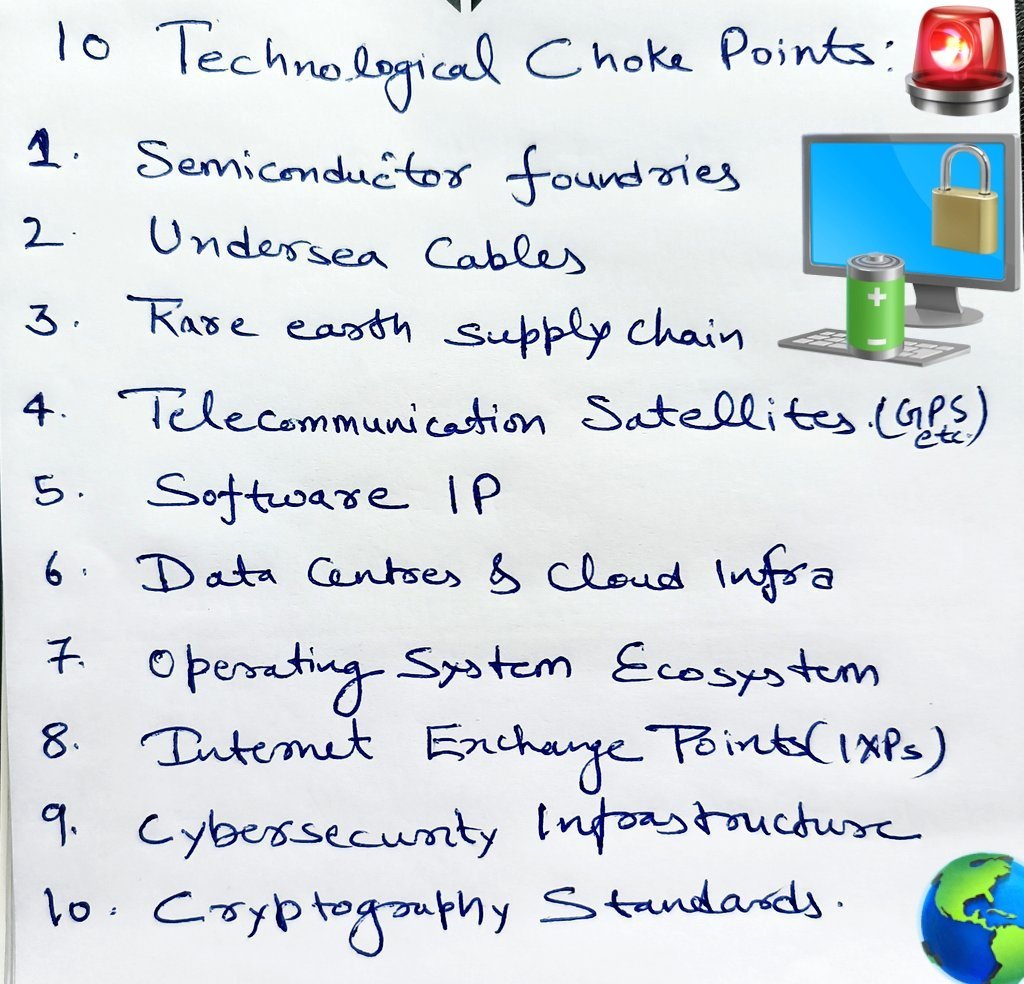We rely on the internet for pretty much everything these days. Work, school, entertainment, even keeping in touch with family. But have you ever stopped to think about what could actually break the internet? It’s not just some magical cloud – it’s a complex system with a few key points that, if disrupted, could cause major problems. Think of them as the internet’s Achilles’ heel.
The 10 choke points shown below are critical to the internet’s operation. Here’s a breakdown of each:
1. Semiconductor Foundries: These are the factories that make the tiny chips that power everything from your phone to massive data centers. If these factories get shut down (think natural disasters, political instability), we’d have a global shortage of electronics. No chips, no internet.
- Taiwan dominates advanced chip manufacturing, producing approximately 90% of the world’s advanced semiconductors. This concentration poses a significant risk; any disruption due to natural disasters, geopolitical tensions, or other factors could severely impact global technology production.
2. Undersea Cables: Most of the internet’s data travels through these cables laid across the ocean floor. If these get cut (accidents happen!), entire regions can lose connectivity. Imagine entire countries going offline!
- Baltic Sea Disruptions: Between November 2024 and January 2025, at least 11 undersea cables in the Baltic Sea were damaged. While some incidents were attributed to accidental causes, such as ship anchors, the frequency and pattern of these disruptions have raised concerns about potential sabotage. In response, NATO launched the “Baltic Sentry” mission to enhance surveillance and protect critical infrastructure in the region.
3. Rare Earth Supply Chain: Many high-tech devices rely on rare earth minerals, and the supply chain for these is concentrated in a few places. If something disrupts that supply, it could slow down the production of everything from smartphones to network equipment.
4. Telecommunication Satellites (GPS): Satellites provide vital services like GPS and help connect remote areas. If they get knocked out (cyberattacks are a possibility), it’s not just maps that stop working. Think about how much we rely on location services for deliveries, transportation, and more.
5. Software IP: This is the code that makes software work. If access to this code is restricted or stolen, innovation grinds to a halt. No new apps, no updates, and security vulnerabilities that never get fixed.
6. Data Centers & Cloud Infrastructure: These are the massive warehouses that store all the data that makes the internet work. If they get attacked or go down, we lose access to everything from our emails to our cloud-based services.
7. Operating System Ecosystem: Think Windows, Android, iOS. These systems are the foundation of our devices. If they become insecure or outdated, our devices become vulnerable.
8. Internet Exchange Points (IXPs): These are like internet traffic hubs. If they get congested or attacked, data slows to a crawl. Imagine a highway with a massive traffic jam – that’s what happens to the internet at IXPs.
9. Cybersecurity Infrastructure: This is the protection against hackers and cyberattacks. If our cybersecurity is weak, hackers can steal data, disrupt services, and even take down entire networks.
10. Cryptography Standards: This is what keeps our online communication secure and private. If these standards are compromised, everything from online banking to personal emails becomes vulnerable.
The internet’s infrastructure is intricate and interdependent. Recent events underscore the importance of proactive measures to enhance resilience across all critical components. Collective efforts from governments, industries, and individuals are essential to safeguard the digital ecosystem.
The internet is no longer a luxury; it’s a critical part of our lives. Protecting these 10 choke points is essential to ensuring that the internet remains a force for good in the world.
What do you think? Are there other choke points we should be worried about? Let’s discuss in the comments!


Can you be more specific about the content of your article? After reading it, I still have some doubts. Hope you can help me.